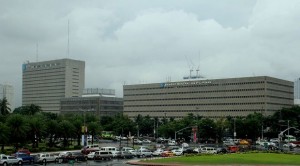BSP keeps key rates steady
The Central bank kept interest rates on hold as expected, confident that consumer prices would remain benign, allowing room for rates to be kept low to boost the economy.
Cheaper fuel and the stable supply of food in the country are expected to keep inflation muted throughout the year, the Bangko Sentral ng Pilipinas (BSP) said on Thursday.
“The Monetary Board believes that prevailing monetary policy settings are appropriately calibrated to the outlook for inflation and domestic economic activity,” BSP Governor Amando M. Tetangco Jr. said in a statement.
During its monetary policy meeting, the BSP said it kept its benchmark overnight borrowing and lending rates at 4 and 6 percent, respectively. Both are just half a percentage point above their record lows. Reserve requirements for banks and yields for special deposit accounts were also kept unchanged.
Banks polled by the Inquirer earlier this week all said rates would be kept on hold.
Article continues after this advertisementThe BSP’s main goal is to protect consumers’ purchasing power by keeping prices stable.
Article continues after this advertisementInflation is expected to average at 2.3 percent for 2015, and 2.6 percent in 2016. Both projections, while still within the official target of 2 to 4 percent, are slightly higher than previous forecasts. Last April, the government reported that consumer prices rose by 2.2 percent—the slowest increase since August 2013.
Rates set by the BSP influence prices of local banks for loans to the public which, in turn, affect demand conditions.
“Unlike other Asian economies where rates have been cut this year, growth in the Philippines has remained relatively strong, reducing the need for central bank support,” think tank Capital Economics said in a note to clients.
The biggest factors to consider, senior officials said, would come from the domestic front. For instance, latest government estimates showed that drier weather as a result of the El Niño phenomenon would persist beyond this year, threatening the stability of the country’s food and power supply.
“You can just imagine the impact on agriculture,” BSP Deputy Governor Diwa C. Guinigundo said.
“Risks to the inflation outlook continue to be broadly balanced,” Tetangco said.
Pending petitions for higher power rates and possible electricity shortages may lead to an acceleration of inflation, while slower global growth would push prices in the opposite direction.
